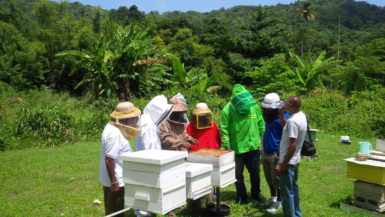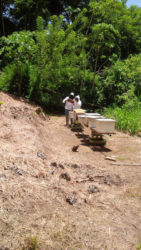A lack of sustained attention to the economic potential of the local beekeeping industry continues to stunt its growth and cause the country to “miss out” on a multi-million dollar sector, according to Vice President of the National Apiculture Society (NAS) Linden Stewart.
“The sector is worth millions but it has simply not been making the kind of progress that it should,” Stewart told Stabroek Business.
After at least five years, the Beekeeping Bill which the NAS hopes will form the basis of national legislation is yet to secure the focused attention of the Guyana Livestock Development Authority (GLDA), though Stewart told this newspaper that he was now more hopeful that the GLDA would give the bill its full attention.

Stewart spoke with Stabroek Business in the wake of his return from the September 12 – 16 Caribbean Beekeeping Congress in Tobago, the theme of which was “Connecting the Caribbean Through Beekeeping.” He said that the locale of the congress afforded the opportunity to mend fences between Guyana and Trinidad and Tobago apiculture officials. The confusion had arisen through an attempt to ship a consignment of honey to Barbados through Trinidad and Tobago. Stewart told Stabroek Business that while consignments of honey had previously been shipped to Barbados and elsewhere in the region through Trinidad and Tobago, this was being done on the basis of a misunderstanding of a Trinidad and Tobago law which forbids the entry of any honey into the country.

Stewart said that on the occasion when the confusion arose, the container was opened and the honey impounded despite a request from the Guyanese exporter that the honey simply be afforded safe passage to Barbados. Instead, Port of Spain offered the option of either dumping the honey or returning it to Guyana, attaching to the latter option the caveat that the return of the honey would be contingent on the shipper paying a US$3,000 penalty. Stewart said it was his understanding that the penalty had been paid though he was concerned that in the absence of an alternative route to sell honey in the region Guyana had lost a small but important market. Much of the honey consumed in the region at present is imported from Canada.
Stewart said that at the Tobago forum country representatives discussed ways in which the regional honey industry could better position itself to take fuller advantage of the global market. He said that in the case of Guyana, the challenge lay in securing both public and private sector backing to expand the industry. “I believe that over the years there has been a great deal of foot-dragging on the matter of taking the industry forward. It is as if we have not recognized the value of the beekeeping industry both as an employer and as a money-earner for the economy,” Stewart said.
Guyana, meanwhile, is slated to host the 9th regional congress in 2018




